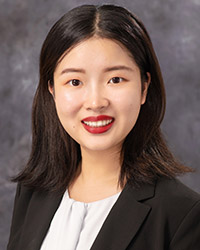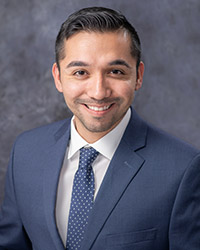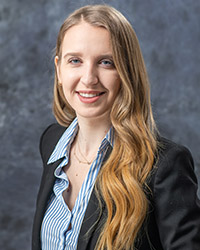Students, advisers offer tips to get the most out of virtual networking
Taking advantage of current connections and drawing on commonalities is a good place to start, they say.

Zijun Zhao ’22 says she relies heavily on networking to learn about career opportunities and the culture at law firms she plans to target in her 2L job search and to make connections that could help her grow in her future legal practice.
That’s become more challenging in 2020, though. Ever since the pandemic shut down opportunities to meet visiting speakers and recruiters on campus, Zhao has been expanding her professional network virtually, finding that outreach to alumni, in particular, has given her a feeling of community, connection, and support.
Her approach is a good one, says Jennifer Caplan ’02, assistant director of professional development programming and advising in the Career and Professional Development Center. And she agrees with Zhao’s sense that networking can help students stave off feelings of isolation, and stresses the importance for all of them to keep making professional connections.
“Alumni generally appreciate opportunities to pay it forward and be helpful to students,” Caplan says.
The Career Center has been hosting virtual events with alumni and employers to encourage student networking. Here, Caplan, Zhao, and other students who were active in networking over the summer offer tips for making and maximizing virtual connections:
Making the first contact
While making a cold call or sending an email can be a first point of contact when networking, Zhao looks for connections to break the ice. She has asked those in her current network to make virtual introductions for her and also researches potential contacts to see if there is anything they might have in common.

“I reached out to one alum because we held externships with the same judge in the Northern District of California,” she says. “I was curious to talk to her about litigation practice related to data and privacy.”
Arturo Nava ’22, who attended some of the Career Center’s summer events, followed up with other attendees on points of interest. He also attended virtual events held by firms or other organizations, like the National LGBT Bar Association and Foundation’s Lavender Law Conference.
“I would encourage students to use these group events as launching pads to initiate one-on-one meetings with attorneys,” Nava says. “I have found that attorneys have been more accessible and flexible with their availability in the age of COVID.”
Henry Gargan ’21 says he started his job search “in earnest” in September, reaching out to people he knew could help, like his career adviser, Stella Boswell, the Assistant Dean of Public Interest and Pro Bono. She arranged for him to speak with a professor at Duke’s Nicholas School of the Environment who had worked for an agency where he had applied and also gave him email addresses of alumni who held the types of positions that would interest him.

Gargan also recommends using social media as a way to meet people in fields of interest.
“I’ve found that following people I want to get to know — and people I want to know me — on Twitter provides a relatively informal space for low-stakes interaction where you can have a bit of personality while engaging with leaders about the topic area you’re trying to break into.”
Getting more out of each connection
Whether students are cold-calling or following up on another point of contact, they need to be prepared for the interaction to get the most out of it, says Caplan. “Prepare for informational interviews and events by researching the employer’s bio and creating a list of thoughtful, personalized questions. If a question can be answered by the recruiting contact or online research, then it is not the best use of that contact’s time.”
She recommends paying attention to detail when following up with a contact at a later time.
“For example, a great networking question is ‘What do you read every day to keep up with trends in your practice areas?’” she says. “If a student begins reading that resource and finds a particular article interesting, it’s a great excuse to reach back out to the contact and demonstrate that they have taken their advice and found it helpful.”

Monika Petkova ’22, a JD/LLMLE candidate who completed a virtual networking program in Silicon Valley over the summer, says it’s also important for students to know their goals for a meeting before reaching out to a contact.
“That can differ depending on who you’re talking to,” she says. “If you’re chatting with a second-year associate, you might want to use this as an opportunity to dive deep into the specifics of why they chose that firm, how they’re liking their practice area so far, and so on. With partners, the conversation would look different.”
Gargan notes that for public interest work, it can be a bit easier to move the conversation forward.
“The great thing about being in public interest or any sort of mission-driven field is that you can connect pretty quickly because you know you at least have that mission in common,” he says. “A lot of public interest lawyers really integrate the work they do into their personalities and their self-concepts.”
Easing social jitters
Acknowledging that networking can be somewhat nerve-wracking, Petkova says that simply conveying enthusiasm can help project confidence and build a connection: “Seeming animated is important, especially over phone and Zoom, where there is no body language to go off. I find that smiling the whole time you’re talking makes a big difference in making your overall demeanor more genuine, even if it feels counterintuitive at first.”
Petkova recommends learning specific interests of the contact to guide the conversation, but counsels against sticking to a script.
“I would say it’s important to come into the meeting prepared with questions, in case the conversation lags, but try your best to steer it towards a normal conversation between two people — instead of a ping-pong back-and-forth Q&A — as much as possible,” she says.
Gargan adds, “Making sure people know you in some meaningful sense is especially critical in public interest jobs where organizations want to be sure they're getting someone who's a reliable attorney and someone they can see themselves becoming close with. Networking for public interest students, at least in my experience, has been about demonstrating to the community you hope to join that you're someone they can trust to be committed and personable, and thus someone they can be comfortable using their limited resources to bring on board.”
Taking advantage of all opportunities
The Career Center also is hosting a number of events throughout the semester to help students connect, including additional employer spotlights and alumni chats. On-campus interviewing (OCI) will be held virtually from Jan. 13 to 16, and students will have opportunities to network with employers in advance.
The Office of Public Interest and Pro Bono and the Career Center together offer a virtual OCI program for government and public interest organizations, which started the first week of classes and is ongoing throughout the semester. Boswell says the offices are trying to expand the program to include more employers, and is also focused on helping students best prepare for these interviews and applications, which are usually more involved and intensive than interviews with big firms.
Caplan reminds students that networking isn’t just about learning about a firm or potential opportunities.
“Networking is a tool for self-assessment and exploration,” she says. “As students learn what inspires them, they will develop and strengthen their personal narrative. The ultimate goal is to figure out what you want to do and why. Deciding to become a lawyer and entering law school are just the beginning.”